Germanwings crash updates: Copilot had health, psychological problems, reports say
French and German officials have agreed that the crash of a Germanwings Airbus A320 was apparently a deliberate act by the plane’s copilot, Andreas Lubitz, who they said locked the other pilot out of the cockpit and forced the plane down. Officials said Friday that torn-up sick notes from doctors discovered at Lubitz's home show he appears to have hidden an illness from Germanwings.
What we know:
- A French prosecutor and the airline agree cockpit recordings show the copilot appears to have deliberately crashed the plane, killing himself and 149 others on board.
- The CEO of Lufthansa says that cockpit protocols were followed, and that the copilot appears to have locked out the pilot when he left to go to the bathroom.
- Multiple European airlines announced they are changing their cockpit rules to mandate that two crew members be in the cockpit at all times.
- The crash does not appear to be linked to terrorism, though officials have not pointed to a specific motive. No suicide note was found at the copilot's home.
- Lubitz was a 27-year-old German national from Rhineland who had been with the company since 2008.
- Full coverage
Germanwings copilot had health, psychological problems, reports say
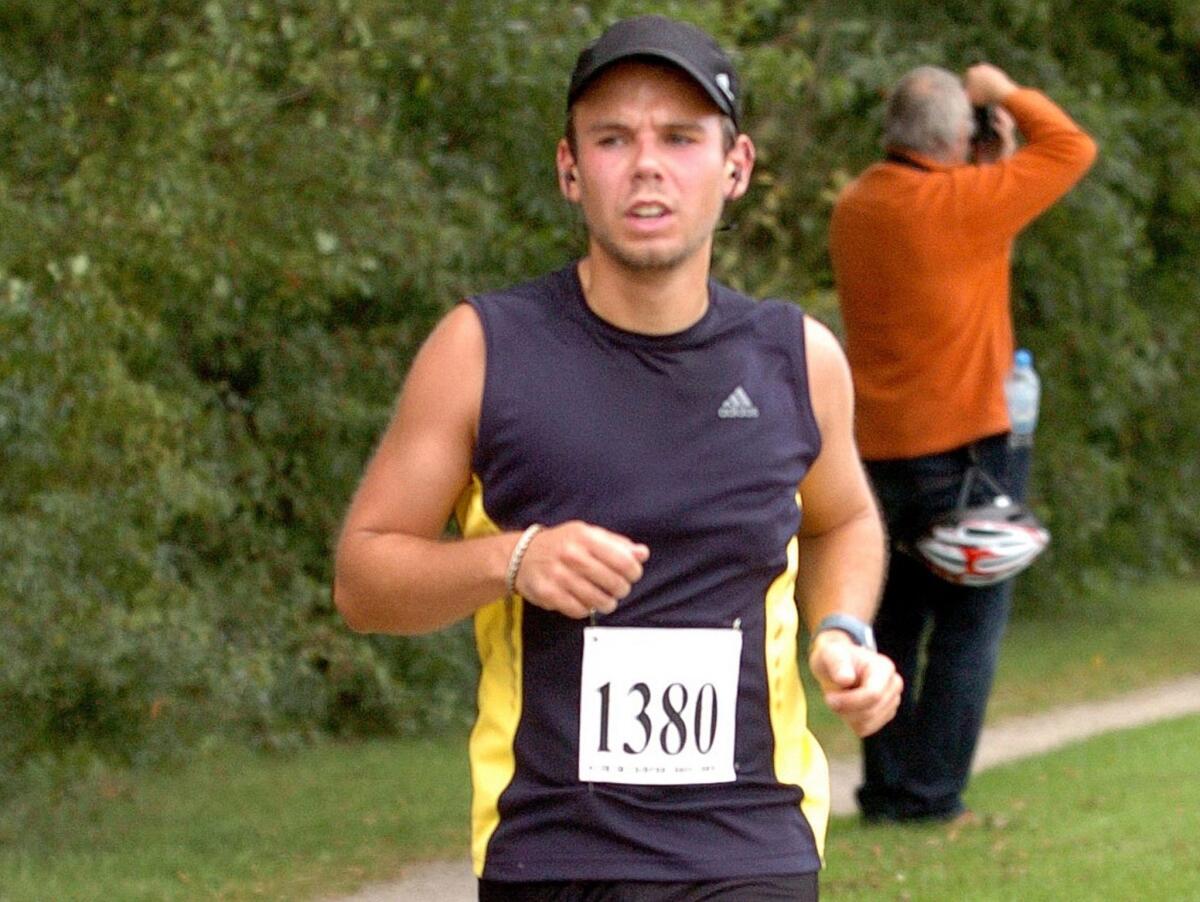
Andreas Lubitz, co-pilot of Germanwings flight 4U9525, runs during the Aerportrace in Hamburg, Germany, 13 September 2009.
EPA
Additional evidence emerged Saturday to suggest that copilot Andreas Lubitz had health issues that should have prevented him from being allowed anywhere near the controls of the Germanwings A320 Airbus that he apparently deliberately flew into a mountain in the southern Alps on Tuesday, killing all 150 people aboard.
As well as medical findings, one of the copilot's former girlfriends came forward to tell a German newspaper that Lubitz, 27, told her while they were dating last year that he planned a spectacular gesture to make sure everyone would “remember” him. She described Lubitz as a “tormented” person who knew how to hide secrets.
The German newspaper Bild spoke to the young woman, identified only as Maria W, 26, who said she dated Lubitz for five months in 2014, during which time he said: “One day I will do something that will change the whole system and then everyone will know my name and remember it.
--Kim Willsher
How the U.S. monitors mental health of airline pilots
The Los Angeles Times spoke to Jim Vanderploeg, a professor of aerospace medicine at the University of Texas Medical Branch in Galveston who works with the Federal Aviation Administration to evaluate airline pilots being treated for depression or substance abuse who want to get back to flying.
According to Vanderploeg, pilots are evaluated about once a year if they're under 40 or every six months if they are 40 or older. During the evaluations, doctors ask about sleep changes or family issues the pilots might be dealing with.
Pilots working for airlines are also required to complete refresher training with flight simulators and are judged on their performance and reactions to stressful situations.
They are also required to ground themselves if they become aware of any changes in their physical or mental status, Vanderploeg says.
Lubitz treated at hospital March 10, but not for depression
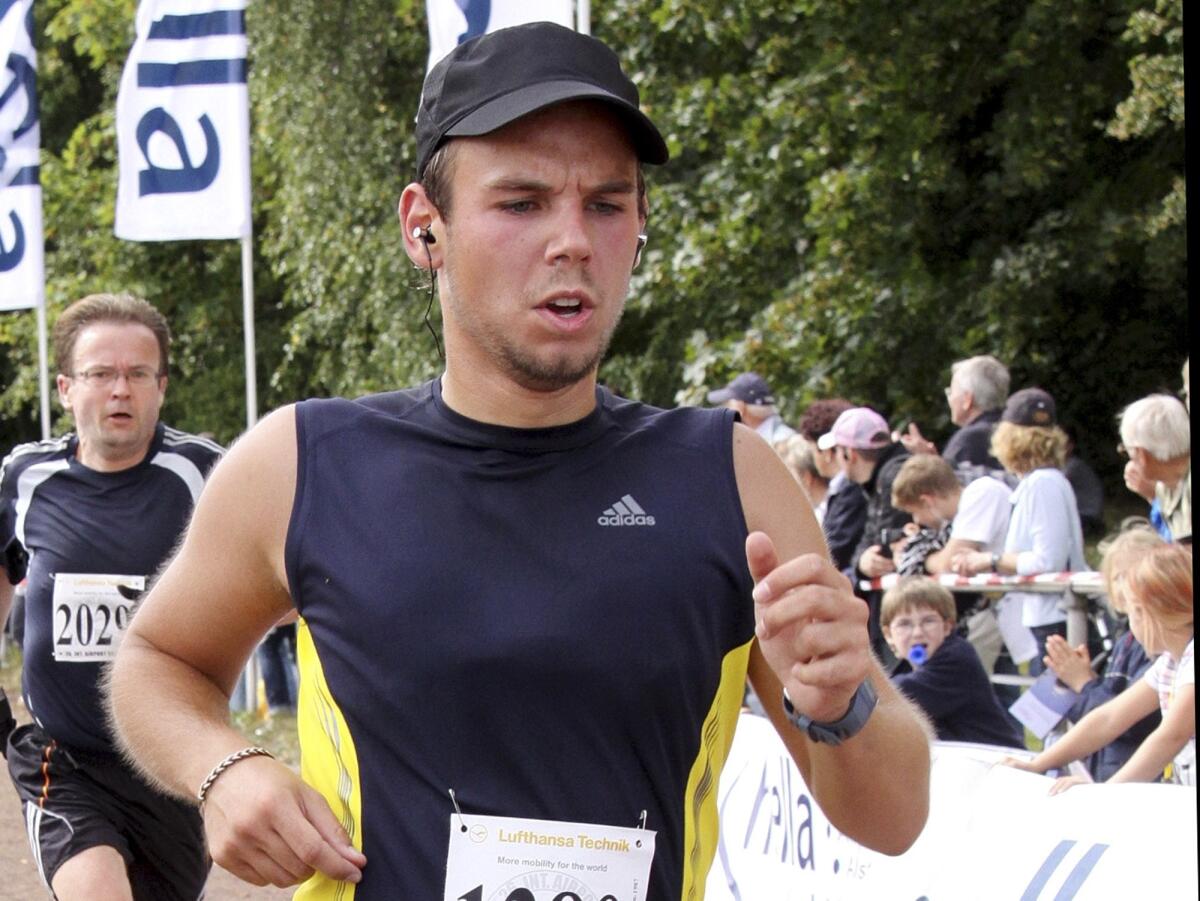
AP
Duesseldorf University Hospital confirmed Friday that it had treated Lubitz in February and March, but not for depression.
The hospital said in a statement that Lubitz came for a “diagnostic evaluation” on March 10, but did not provide details about his condition. It said it had submitted Lubitz's medical records to prosecutors in Duesseldorf.
--Kim Willsher
European aviation officials recommend policy of two crew members in cockpit
The European Aviation Safety Agency has issued a temporary recommendation that calls on all airlines to adopt a policy that ensures a minimum of two crew members, including at least one pilot, remain in a plane's cockpit at all times during flight.
The policy received attention after it was revealed that the captain of the Germanwings plane had gotten up to go to the bathroom and could not get back into the cockpit.
The aviation agency says it is making the recommendation based on the "information currently available following the dramatic accident" in the French Alps.
Agency spokesman Dominique Fouda told The Times that while the recommendation is not binding, he expects most, if not all, European airlines to adopt it soon.
A permanent, binding change in aviation rules would require action by the EU's Parliament, Fouda said.
'We haven't found a single body intact'
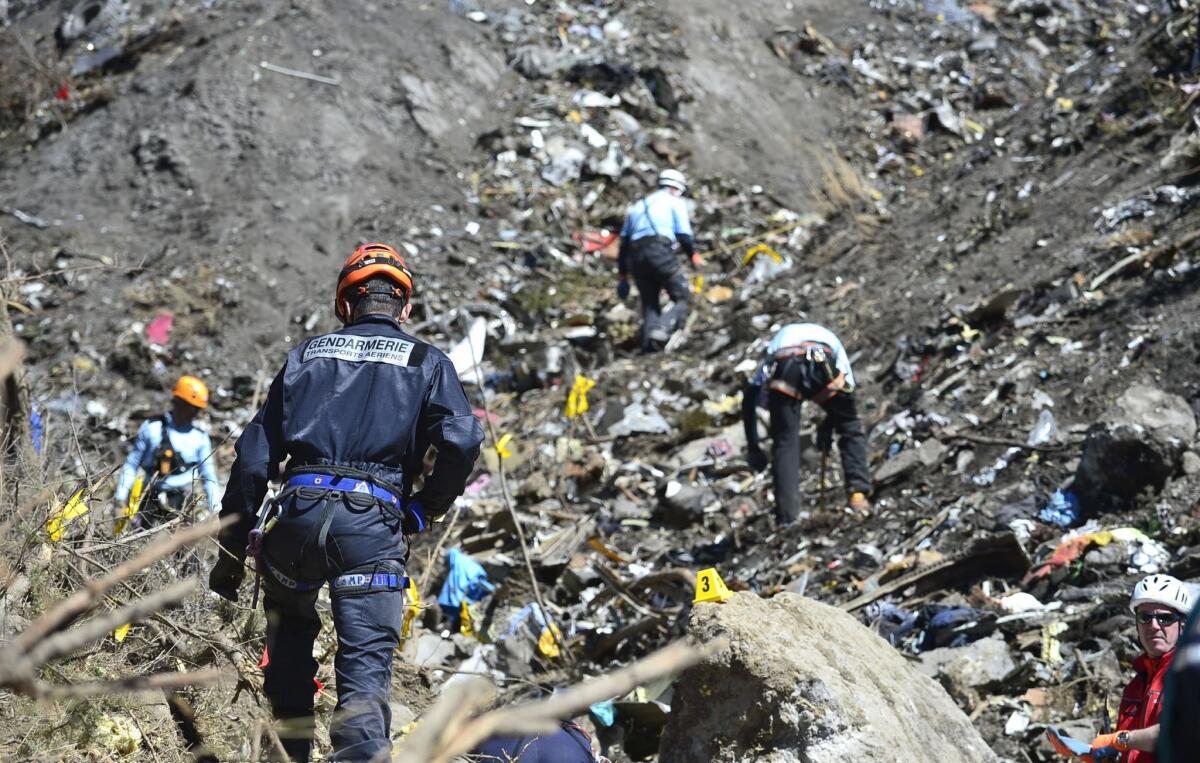
A handout photo taken on March 26, 2015 and released by the French Interior Ministry on March 27, 2015 shows a Gendarme from the Air Transport Gendarmerie (L) working at the crash site of the Germanwings Airbus A320 near Le Vernet, French Alps.
Francis Pellier / AFP/Getty Images
French police say they have recovered hundreds of pieces of remains from the plane crash site, but so far have not found any whole bodies.
"We haven't found a single body intact," said Col. Patrick Touron, according to the Associated Press.
Officials have previously said they were collecting DNA samples, in hopes of identifying remains, from the families of the 150 people who died.
Germanwings confirms it did not get sick note
Germanwings just released this statement:
"Currently there is media coverage that the co-pilot of flight 4U 9525 was given a sick note for the day of the accident on Tuesday. Germanwings declares that a sick note for this day was not submitted to the company.
This corresponds to the insights of the senior prosecutor of Dusseldorf. According to these insights, “a torn-up current sick note, also valid for the day of the incident” was found in the co-pilot's documents. According to the prosecutor's statement, this “would -- according to preliminary evaluation -- support the assumption that the deceased had concealed his illness towards his employer and his occupational environment.”
Copilot had medical certificate from FAA
The U.S. Federal Aviation Administration had issued Germanwings copilot Andreas Lubitz a third-class medical certificate, the Associated Press reported.
In order to obtain such a certificate, a pilot must be cleared of psychological problems including psychosis, bipolar disorder and personality disorder “that is severe enough to have repeatedly manifested itself by overt acts.”
The certificate also means that he wasn't found to be suffering from another mental health condition that “makes the person unable to safely perform the duties or exercise the privileges” of a pilot's license, the news service reported.
Lufthansa will join other airlines by adopting 2-person cockpit rule
Following other European airlines, Lufthansa says it too will mandate that two people remain in the cockpit at all times.
Peter Garrison, a pilot who writes an accident-analysis column for Flying Magazine, writes in an op-ed in The Times about the future of automation in planes and the elements of human error that may never be eliminated:
"We overlook even egregious pilot errors -- Colgan Air, Air France 447 and TransAsia are recent examples -- in our faith that human beings are ultimately more reliable than machines. What makes the Germanwings accident so terrible to contemplate is that, if it turns out to be true that the first officer deliberately crashed the plane, it offends our sense of common humanity. We may forget mistakes, but we cannot forgive a betrayal."
Germanwings copilot may have hid illness from employers
Prosecutors say they have found evidence that the copilot of the Germanwings plane that crashed in the French Alps appears to have hidden evidence of an illness from his employers.
Prosecutors in the western city of Duesseldorf say they seized medical documents from the home of Andreas Lubitz that indicate “an existing illness and appropriate medical treatment.”
Police make 'significant' discovery at copilot Andreas Lubitz's home
German police investigating the role of copilot Andreas Lubitz in the crash of Germanwings Flight 9525 in the French Alps said they made a "significant" discovery while searching his home near Duesseldorf, reports said.
The development comes amid reports in the German media that Lubitz, 27, may have suffered from depression.
"We have found something which will now be taken for tests. We cannot say what it is at the moment but it may be very significant clue to what has happened," Markus Niesczery, a spokesman for the Duesseldorf Police Department, told the Daily Mail newspaper late Thursday.
'This is now an issue of how we keep mass murderers out of the cockpit'
VIEW MORE PHOTOS (Maruis Becker / AFP/Getty Images)
The apparently deliberate act of a German pilot that caused the deaths of 150 people in a plane crash France is leading to a broad reexamination of international airline security rules, which allowed the pilot to lock his more senior crew member out of the cockpit.
The cockpit door locking system, which was designed after the Sept. 11, 2001, attacks in the United States, was intended to prevent suicidal terrorists from seizing control of jetliners, but may have had the unintended consequence of allowing a single pilot to do the same.
“We are absolutely headed to a reevaluation of the system,” said Robert Ditchey, an aviation safety expert and former airline executive. “This is now an issue of how we keep mass murderers out of the cockpit.”
Infographic: How the cockpit lock works
(Kyle Kim / Los Angeles Times)
There are three separate settings that can be chosen inside the cockpit. One of them denies access -- even emergency access -- for at least five minutes.
A look at other pilot-caused tragedies
Los Angeles Times
Pilots are believed to have intentionally caused several fatal plane crashes worldwide, but a list compiled by the Aviation Safety Network shows only two such crashes since 1976 that killed nearly as many people as this week's Germanwings disaster.
In October 1999, an EgyptAir jet carrying 217 people to Cairo from Los Angeles crashed shortly after a scheduled stop in New York, killing everyone aboard. The copilot was briefly alone in the cockpit and nudged the plane into a steep dive, then resisted the pilot's efforts to pull the plane back up, the U.S. National Transportation Safety Board concluded.
In December 1997, a SilkAir jet traveling to Singapore from Jakarta, Indonesia, crashed in Sumatra, killing all 104 people aboard. The NTSB and other agencies have suggested that the captain, who had been experiencing financial and work-related difficulties, “may have committed suicide by switching off both flight recorders and intentionally putting the Boeing 737 in a dive,” the Aviation Safety Network said.
Above, a woman in Santa Ana looks at photos of a friend who died in the EgyptAir crash.
Police search co-pilot's apartment
Police in Germany searched the Duesseldorf apartment of Germanwings co-pilot Andreas Lubitz on Thursday, CNN reported.
A team of five investigators searched his home "looking for clues as to what the co-pilot's motivation might have been," a police spokesman told the network .
Video showed investigators loading at least two boxes into a police vehicle before driving off.
Someone in cockpit reprogrammed autopilot, data indicate
Data analyzed by flight tracking website Flightradar24 appear to show that the Germanwings plane's autopilot was manually changed from an altitude of 38,000 feet to 100 feet.
Nine seconds later, the plane began its gradual descent, the website said in a post.
"We suspect that you can't set autopilot to [zero] altitude," the post said, adding that Flightradar24 had forwarded its analysis to investigators two days ago.
State Dept. confirms identity of 3rd U.S. victim of crash
State Department spokesman Jeff Rathke confirmed at a briefing today that the third American citizen killed in the Germanwings crash was Robert Oliver.
According to ABC News, Oliver was 37 and was born in Barcelona, Spain. He worked as a real estate coordinator for Desigual, a Spanish fashion company, ABC reported, and was heading to Duesseldorf, Germany, on a business trip with a colleague when the plane crashed.
Airlines, aviation group rethink cockpit rules
An organization that represents Germany's biggest airlines, including Lufthansa, says it will propose new rules to ensure that two crew members are always in the cockpit of a plane in flight. The German aviation group's announcement Thursday came as other airlines, including Norwegian Air Shuttle, Britain's EasyJet and Air Canada, said they would require on their flights that two crew members be in the cockpit at all times.
In the U.S., regulations already mandate that when a pilot leaves the cockpit to use the bathroom, a flight attendant must enter the cockpit and stay there until the pilot returns. In addition, whenever a cockpit door is open, the U.S. rules say flight attendants must create a barrier between the cockpit and passengers, typically by using a beverage cart.
How do you open a cockpit door from the outside?
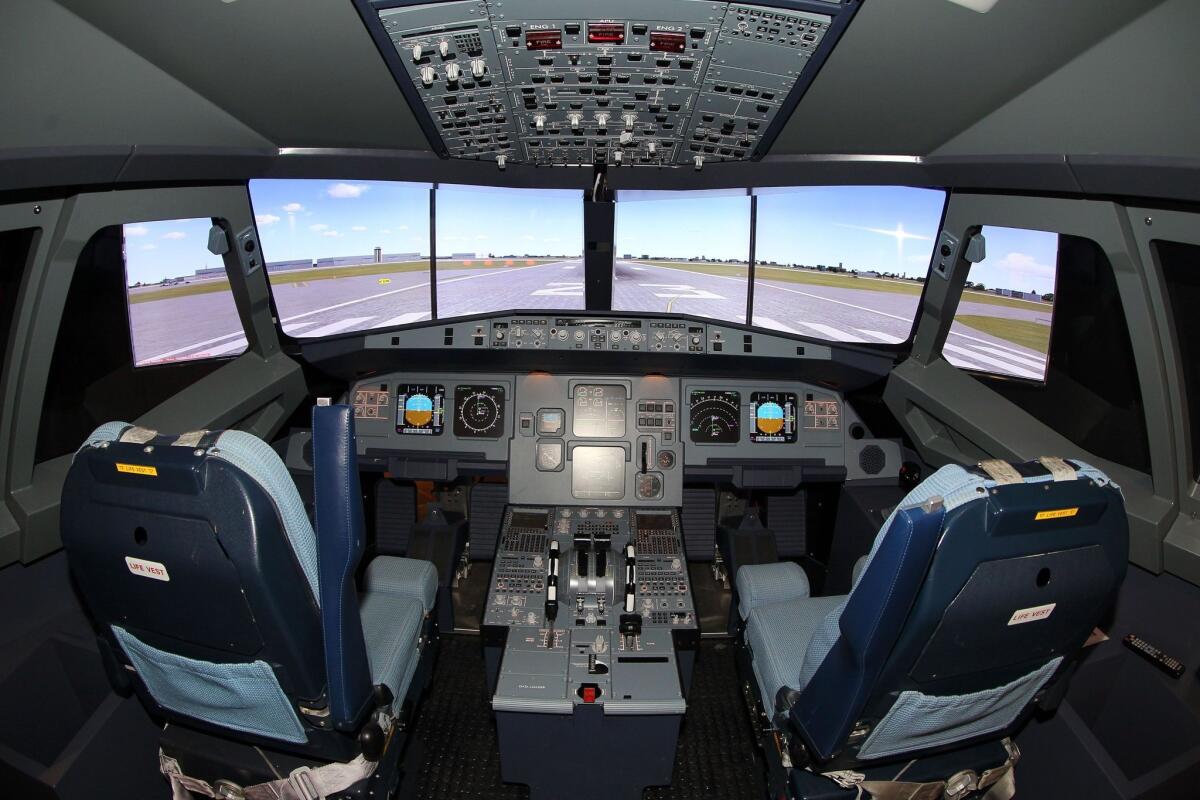
Malte Christians / AFP/Getty Images
If there is no response from the cockpit for a request to open a locked door, the flight crew can punch in an override code on a keypad, which sets off a 30-second alert in the cockpit, according to training materials for Airbus A320 jets.
If there's no response from the cockpit by the end of the 30-second alert, the door automatically unlocks for five seconds and can be opened from outside.
The flight crew inside the cockpit also has an option to deny emergency outside access by hitting a "lock" toggle, according to the Airbus training materials.
If the "lock" toggle is selected, the outside keypad is then disabled for five to 20 minutes or until the pilot in the cockpit decides to unlock the door, according to the training materials.
Investigators have not said whether the pilot who was locked out of the Germanwings cockpit tried to use a keypad to get in, or whether the co-pilot toggled the lock switch to keep him out.
-- Matt Pearce
'Aircraft-assisted' pilot suicides are rare, FAA says
“Death by the intentional crashing of an aircraft is an infrequent and uncommon event,” a recent Federal Aviation Administration report on pilot suicides concluded, but it does happen occasionally. According to the report on "aircraft-assisted pilot suicides":
From 2003 through 2012, there were eight aircraft crashes in the United States that were conclusively deemed to be pilot suicides. They represented less than 0.3% of fatal aviation incidents in that 10-year period.
All eight of the pilots were men, and all but one were flying alone when they crashed. The exception was a recently divorced student pilot accompanied by his child, who was the subject of a custody dispute. The pilot crashed the aircraft into the home of his former mother-in-law, killing himself and the child.
None of the eight pilots had reported having depression or any other mental disorder, but testing showed that two had been taking antidepressants. Seven of the eight had experienced domestic problems.
-- Lauren Raab
Details on Andreas Lubitz's pilot training and experience
European Pressphoto Agency
Germanwings Flight 9525 co-pilot Andreas Lubitz, who began his flight training in 2008, interrupted his training for three months that year, Lufthansa Chief Executive Carsten Spohr told reporters.
The CEO declined to disclose the reason for the hiatus, citing German regulations on the privacy of medical records. Spohr also said such interruptions are common.
After completing the training, Lubitz passed all medical and aviation tests and "was 100% apt to pilot the aircraft,” the executive said, adding that Lubitz worked for 11 months as a flight attendant while waiting for a pilot position to open up.
Lubitz began flying with Germanwings in September 2013 and logged 630 flight hours without incident, Spohr said.
Outside Andreas Lubitz's house
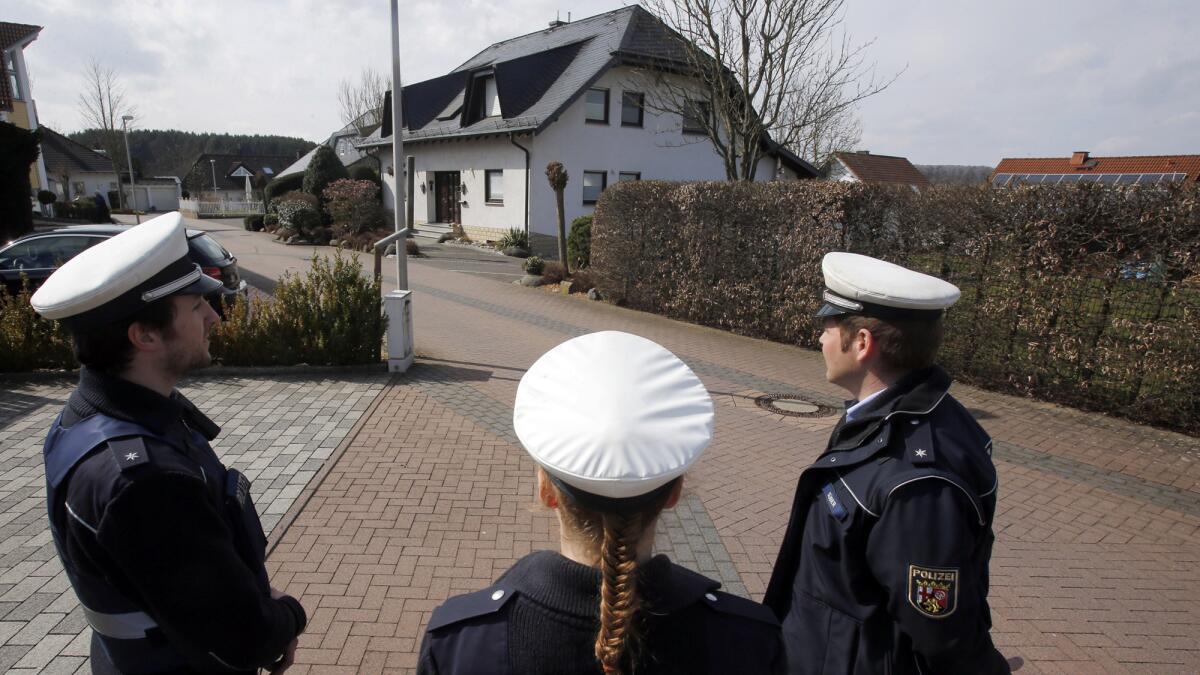
Associated Press
Police earlier today were guarding the house where Andreas Lubitz lived part-time with his parents in Montabaur, Germany.
Norwegian airline to require 2 crew members in cockpit at all times
In the wake of the Germanwings crash, Norwegian Air Shuttle on Thursday said it would mandate that two crew members be in the cockpit when a plane is in flight.
The new rule will be adopted "as soon as possible" on all commercial flights, an airline spokeswoman told the Associated Press.
Norwegian Air Shuttle is the third-largest discount carrier in Europe.
On flights operated by U.S. airlines, according to experts, the typical procedure when a pilot must leave the cockpit is to have a flight attendant enter the cockpit and open the door when the pilot returns.
-- Kurtis Lee
Purported photo of Andreas Lubitz surfaces

Screen shot of Facebook page
Multiple Facebook pages created in the hours since officials identified Andreas Lubitz as the co-pilot of Germanwings Flight 9525 have emerged showing a photo that is believed to be of the 27-year-old.
The photo, reported to have been taken from Lubitz's original Facebook page, appears to have been shot in California, with the Golden Gate Bridge in the background.
The Facebook pages offer little insight about Lubitz; they apparently were created simply to show an image of the man who officials say downed the Germanwings Airbus A320.
Lubitz’s own Facebook page, before it was taken down Thursday, was unremarkable in its compilation of “likes” for fast-food eateries in his hometown of Montabaur, Germany, and a climbing wall in Koblenz that he apparently frequented, the German broadcaster N24 said. He was described as quiet and unassuming, with a sense of humor reflected in his Facebook page's links to comic websites, his favorite said to be “Laugh Until Your Face Hurts,” the broadcaster said.
-- Kurtis Lee
U.S. mining intelligence databases for any terrorism links
German and French officials say they have not uncovered any evidence that terrorism motivated the co-pilot, but analysts at the U.S. National Counterterrorism Center in McLean, Va., are checking intelligence databases to see if anyone aboard the Germanwings flight, including co-pilot Andreas Lubitz, had a connection to a known terrorist group, a U.S. counterterrorism official said, speaking on the condition of anonymity in order to discuss sensitive operations.
"We have nothing to report at this time," the official said.
Sign up for Essential California
The most important California stories and recommendations in your inbox every morning.
You may occasionally receive promotional content from the Los Angeles Times.







